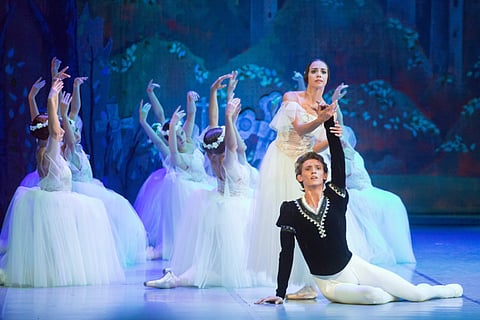Dubai Opera thrills with ‘Coppelia’ and ‘Giselle’ ballets
Russian State Ballet and Orchestra of Siberia brings spectacularly colourful and skilful shows to the UAE

In an age dominated by PlayStations, attention deficit and instant nirvana, some elegant and enduring works of art still never cease to fill us with what Rainer Maria Rilke called “that which we could not grasp”.
The ballets Coppelia and Giselle, as performed by the Russian State Ballet and Orchestra of Siberia at the Dubai Opera over the weekend, are among such amazing and liberating works of art.
The spectacularly colourful and buoyant first half of Coppelia, set to the delightful music of Leo Delibes and the story of ETA Hoffmann, shows the young lovers Franz and Swanilda intrigued by what appears to be the beautiful daughter of the mysterious toymaker Dr Coppelius.
As one of the most popular comedy ballets in history, Coppelia enjoys a rare status — it offers something for everyone. Humour is in plentiful supply, along with some skilful dancing sure to keep hard-core ballet fans engrossed. In addition, Coppelia also brought to the ballet stage several firsts when it premiered in 1870 — from the appearance of mechanised dolls and marionettes to the introduction of folk and national dance such as the mazurka. The dazzling production and choreography by Russian State Ballet ensures full justice to the mystery and magic of the ballet, without compromising on its artistic integrity.
As the opening score recurs as a leitmotif throughout the ballet, the dramatic turn of events is interspersed with some charming mazurka and Czardas. Maria Litvinenko’s graceful poise and carefree expressions bring Swanilda to life, while Franz, danced by Georgy Bolsunovsky, delivers an equally memorable performance. The distinctly less dramatic second half was more sonorous and effervescent — from the celebration of Swanilda and Franz’s marriage to the scene where Dr Coppelius, played brilliantly by Alexei Balva, gifts the new couple the doll that was at the centre of all intrigue.
But perhaps the most critical character of Coppelia is the music of Delibes — and the orchestra under the baton of music director Anatoly Tchepurnoi makes it a fantastic evening to remember.
The immensely talented Bolsunovsky returns in a contrasting role the next night — as Hans the forester in one of the greatest classics of the Romantic ballet, Giselle.
First performed in Paris in 1841, Giselle follows the tale of the eponymous peasant girl who dies of a broken heart after being betrayed by her lover, Count Albrecht. But the incredible music of Adolphe Adam, along with a revision of the original Jean Coralli-led choreography by Sergei Bobrov — one of the most gifted contemporary Russian choreographers and the artistic director of the Krasnoyarsk State Ballet and Theatre company — make sure that the production is fresh and appealing even after 175 years.
The core messages of love, betrayal and redemption obviously resonate with any audience, and some exquisite performances by the support cast of the ballet allows the story of Theophile Gautier to unfold with complete clarity right to its tragic but redemptive end.
From Hans, a tempestuous forester in the first half and a grim and grieving man in the second, who dances to death, to Giselle’s superstitious mother Berthe (Vera Surovtseva) and Myrtha, the queen of the haunting apparitions known as the Wilis (Anna Fedosova) and the village belles — each and every character provide some admirable performances.
But the stars of the night were Giselle herself — one of the greatest and most difficult ballerina roles of all times, danced by the young Ekaterina Bulgutova — and Count Albrecht, played by Yuri Kudriavtsev. Bulgutova’s portrayal of the guileless and passionate peasant girl fills you with foreboding at the tragedy awaiting her, and the scene where she goes mad upon discovering the masquerading count’s dalliance and kills herself in the first act, is delivered with pathos befitting the character’s utter despair.
Kudriavtsev excels in combining technical brilliance with almost spiritual grace, to the extent where you feel forgiving of his betrayal in the nocturnal scene of the second act — where the Wilis seek out Albrecht and Giselle is finally able to save his life due to daybreak before returning to her grave, leaving the grieving and remorseful count in a desolate setting.
With its bevy of great performances, the productions of both Giselle and Coppelia are a fresh reminder why the ballet is an eternal art and Russian dancers one of its finest exponents.
Sign up for the Daily Briefing
Get the latest news and updates straight to your inbox



